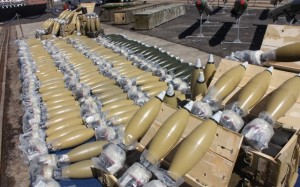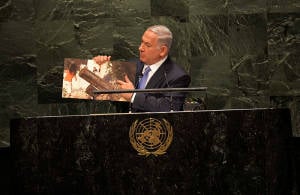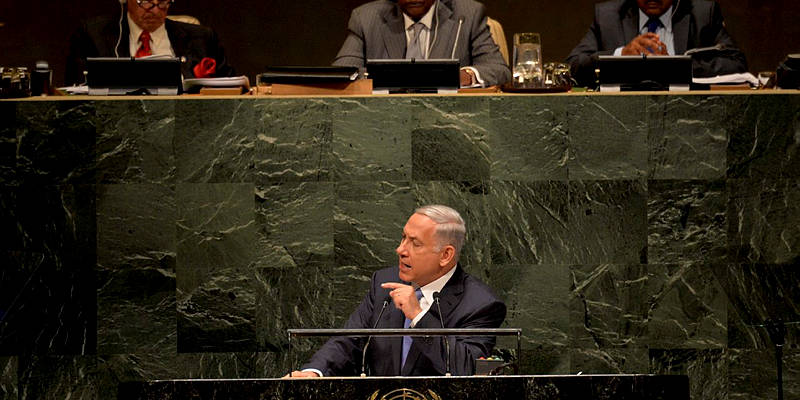Militant Islam is on the march around the globe and must be stopped before it’s too late, Prime Minister Benjamin Netanyahu urged leaders at the United Nations General Assembly on Monday.
Israeli Prime Minister Benjamin Netanyahu clearly outlined the terrorist threats facing Israel and the rest of the world and laid the groundwork for a revamped peace process – including a historic compromise by Israel – in a hard-hitting speech Monday at the United Nations General Assembly, which was punctuated by applause from many of those present.
“The people of Israel pray for peace but our hopes – and the world’s hopes – for peace are in danger because, everywhere we look, militant Islam is on the march,” said Netanyahu.
‘A Fanatic Ideology’
Militant Islam threatens everyone and is like a cancer that will spread if it is not stopped, he warned.
“Their ultimate goal is to dominate the world…. To protect the peace and security of the world, we must remove this cancer before it’s too late.”
Netanyahu listed several terrorist organizations operating around the world, which “all share a fanatic ideology.”
UN member states whose representatives applauded US President Barack Obama’s speech last week about intensifying the fight against the Islamic State terrorist organization (also called ISIS or IS), but who “opposed Israel for confronting Hamas….evidently don’t understand that ISIS and Hamas are branches of the same poisonous tree…. When it comes to their ultimate goals, Hamas is ISIS and ISIS is Hamas.”
Iran: The World’s Most Dangerous State
The Israeli leader devoted a substantial portion of his speech to Iran’s nuclear threat, which seems to be viewed less urgently in the West than Islamic State, although the threat is equally dangerous.
“The question before us is whether militant Islam will have the power to realize its unbridled ambitions,” Netanyahu stated, warning:
“There is one place where that could soon happen – the Islamic State of Iran.”
“To say that Iran doesn’t practice terrorism is like saying Derek Jeter never played shortstop for the New York Yankees,” Netanyahu quipped.

Weapons supplied by Iran for Hamas in Gaza discovered in March by IDF. (Photo: IDF)
“Some still argue that Iran’s global terror campaign…that this is the work of the extremists. They say things are changing. They point to last year’s elections in Iran…. They believe [Prime Minister] Rouhani and [Foreign Minister] Zarif genuinely want to reconcile with the West, that they’ve abandoned the global mission of the Islamic Revolution.”
“Don’t be fooled by Iran’s manipulative charm offensive,” Netanyahu urged. “It’s designed for one purpose, and for one purpose only: To lift the sanctions and remove the obstacles to Iran’s path to the bomb. The Islamic Republic is now trying to bamboozle its way to an agreement that will remove the sanctions it still faces, and leave it with the capacity of thousands of centrifuges to enrich uranium.
“This would effectively cement Iran’s placeas a threshold military nuclear power. In the future, at a time of its choosing, Iran, the world’s most dangerous state in the world’s most dangerous region, would obtain the world’s most dangerous weapons,” he declared.
“Allowing that to happen would pose the gravest threat to us all.”
‘Terrorist Rights Council’
The anti-Israel bias displayed time and again by the UN’s Human Rights Council, whose name he described as “an oxymoron,” was a “manifestation of the return of the world’s oldest prejudice…anti-Semitism.” The council has become a “Terrorist Rights Council” and has sent a message to terrorists around the world that it is acceptable to use human shields, he said.

PM Netanyahu shows UN members a news photo proving Hamas’s use of human shields. (Photo: Avi Ohayon/GPO)
He also took aim at the “brazen lies…against my country and against the brave soldiers who defend it,” made at the UN on Friday by Palestinian Authority President Mahmoud Abbas.
Hamas committed war crimes this summer by using civilians as human shields, “and I say to President Abbas, these are the…war crimes committed by your Hamas partners in the national unity government, which you head and you are responsible for. And these are the real war crimes you should have investigated, or spoken out against, from this podium last week,” Netanyahu said to applause.
‘Historic Compromise’ Possible
He pledged to make additional concessions for peace, but did not explain what that might entail.
In the context of “a genuine peace” with “rock-solid security arrangements on the ground,” Netanyahu said, he was “willing to make a historic compromise.”
Many in the large hall applauded as he added, “Not because Israel occupies a foreign land: the people of Israel are not occupiers in the Land of Israel. History, archeology and common sense all make clear that we have had a singular attachment to this land for over 3,000 years.”
New Dangers, New Opportunities
The situation is bad but peace is still possible, he said.
“The Middle East is in chaos: states are disintegrating and militant Islamists are filling the void…. [Yet] in Israel, we have a record of making the impossible possible.”
To do so, “the old template for peace must be updated. It must take into account new realities and new roles and responsibilities for our Arab neighbors….
“There is a new Middle East: it presents new dangers, but also new opportunities. Israel is prepared to work with Arab partners and the international community to confront those dangers and to seize those opportunities. Together we must recognize the global threat of militant Islam, the primacy of dismantling Iran’s nuclear weapons capability and the indispensable role of Arab states in advancing peace with the Palestinians.”
Author: Joanne Hill
Staff Writer, United with Israel
